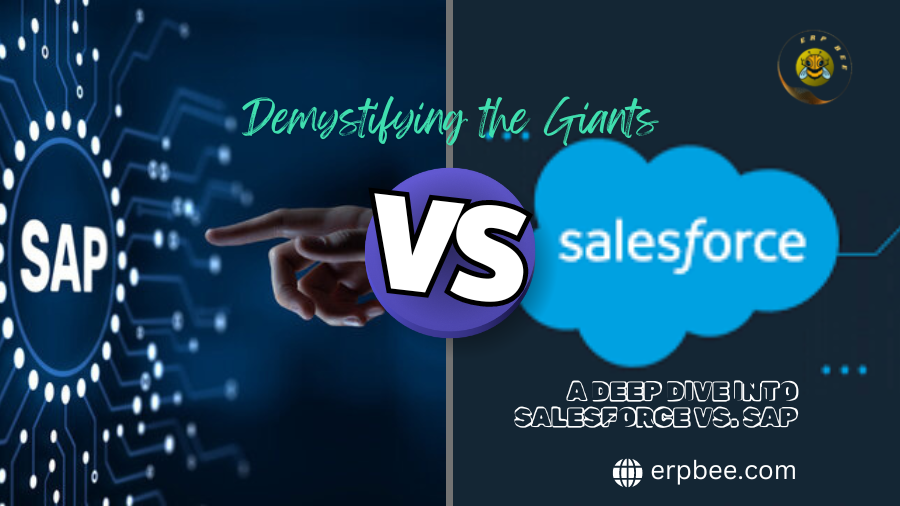In the ever-evolving landscape of business software, two titans stand out: Salesforce and SAP. Both are household names, but for those unfamiliar with their intricacies, choosing between them can be a daunting task. This blog aims to shed light on the key difference between SAP and Salesforce, helping you determine which solution best suits your business needs.
Introduction: Salesforce vs. SAP
At first glance, both Salesforce and SAP appear to be customer relationship management (CRM) platforms. However, a closer look reveals a crucial distinction. Salesforce is a pure-cloud CRM solution, offering a suite of features specifically designed to manage customer interactions and foster stronger relationships. SAP, on the other hand, is an Enterprise Resource Planning (ERP) giant. While SAP does offer a CRM module (SAP CRM), its core strength lies in integrating various back-office functions like finance, inventory, and human resources.
Salesforce Overview
Salesforce is the world's leading cloud-based CRM platform. It boasts a user-friendly interface, robust mobile capabilities, and a vast app marketplace that extends its functionality. Salesforce excels in:
- Sales Management: Streamline lead generation, opportunity tracking, and forecasting.
- Customer Service: Provide exceptional customer support through ticketing, live chat, and a knowledge base.
- Marketing Automation: Personalize marketing campaigns, automate workflows, and track campaign performance.
SAP Overview
SAP is a comprehensive ERP system known for its scalability and industry-specific solutions. It goes beyond CRM, offering a centralized platform to manage all core business processes. Here are some of SAP's strengths:
- Financial Management: Manage accounts payable and receivable, automate financial reporting, and gain real-time financial insights.
- Supply Chain Management: Optimize inventory levels, track deliveries, and gain visibility into your entire supply chain network.
- Human Capital Management: Recruit, train, and manage your workforce efficiently with payroll processing and performance management tools.
Features Comparison: SAP vs. Salesforce
| Feature | Salesforce | SAP |
|---|---|---|
| Core Focus | Customer Relationship Management | Enterprise Resource Planning |
| Deployment | Cloud-based | Cloud & On-premise |
| Scalability | Highly Scalable | Highly Scalable |
| Customization | Moderate | High |
| Industry Focus | General | Industry-specific Solutions |
| User Interface | User-friendly | More complex |
| Integration | Extensive | Extensive (with additional tools) |
| Pricing | Subscription-based | Complex (per user, modules) |
Salesforce Use Cases
- Businesses of all sizes, from startups to large enterprises, can leverage Salesforce to improve sales, marketing, and customer service.
- Ideal for B2B and B2C companies looking for a user-friendly CRM solution to manage customer interactions and automate workflows.
SAP Use Cases
- Large enterprises with complex business processes and a need for industry-specific solutions.
- Manufacturers, distributors, and other companies requiring comprehensive inventory management and supply chain visibility.
Salesforce CRM & SAP ERP: Working Together
While Salesforce and SAP seem like competitors, they can be powerful allies. Many businesses integrate Salesforce with SAP to create a seamless flow of data between customer interactions and core business functions. This can lead to improved efficiency, better decision-making, and a more holistic view of the customer journey.
Online Case Management: SAP vs. Salesforce
Both platforms offer case management capabilities. However, SAP caters more towards complex service requests and integrates seamlessly with back-office systems for a more comprehensive service experience. Salesforce is well-suited for simpler customer support needs and excels in providing a user-friendly interface for both agents and customers.
SAP vs. Salesforce: Price Comparison
Salesforce offers a subscription-based pricing model with various tiers catering to different business needs. SAP pricing is more complex, typically involving per-user and per-module fees. Additionally, on-premise deployments require significant upfront investments in hardware and software.
SAP vs Salesforce: Which is Better for Business?
The answer depends on your specific needs. Here's a quick guide:
- Choose Salesforce if: You need a user-friendly and scalable CRM solution to manage customer interactions and automate workflows.
- Choose SAP if: You are a large enterprise with complex business processes requiring an integrated ERP solution with industry-specific functionalities.
Are you Looking for Professional ERP Software to Help Your Business?
Consider reaching out to us for a consultation to discuss your specific needs and explore how SAP solutions can empower your business. Visit our website for more information.
Conclusion
Understanding their core strengths will help you make an informed decision.
- Salesforce CRM excels in customer-centricity, offering a user-friendly platform for building stronger relationships with your customers.
- SAP shines in enterprise-wide resource management, providing a centralized system to streamline complex business processes.
Salesforce vs. SAP Conclusion
Ultimately, the best choice depends on your business size, industry, and specific requirements.
- For businesses prioritizing customer interactions and a cloud-based solution, Salesforce is a compelling option.
- For larger enterprises requiring a comprehensive ERP with industry-specific functionalities, SAP might be the better fit.
SAP CRM vs Salesforce: FAQs
Which one is better?
There's no single "better" option. It depends on your needs. Salesforce excels in CRM, while SAP offers a broader ERP suite.
What is the difference between both CRM?
Salesforce is a pure-cloud CRM platform, while SAP CRM is a module within the larger SAP ERP system. Salesforce focuses on customer interactions, whereas SAP CRM integrates with other back-office functionalities.
What is the difference between SAP HANA and Salesforce?
SAP HANA is an in-memory database platform used by SAP applications, including SAP CRM. Salesforce has its own cloud-based infrastructure.
कोणते चांगले आहे, SAP किंवा Salesforce? ( Which is better, SAP or Salesforce?)
तुमच्या व्यवसायाच्या गरजेनुसार ते ठरते. ग्राहक व्यवस्थापनावर आणि ढगामधगाम वादळावर (cloud-based) आधारित सोल्यूशन शोधत असाल तर Salesforce चांगला पर्याय आहे. परंतु, जर मोठ्या उद्योगासाठी इंडस्ट्री-स्पेसिफिक फंक्शनालिटीज असलेले व्यापक ERP हवे असाल तर SAP चांगला पर्याय ठरू शकेल.
By considering these factors and exploring the capabilities of each platform, you can make a well-informed decision that empowers your business to thrive.
Explore our latest blogs:
Navigating the SAP BI Landscape: BW vs. Modern BI Tools
